Elevator to the Gallows Blu-ray Movie
HomeElevator to the Gallows Blu-ray Movie 
Ascenseur pour l'échafaudCriterion | 1958 | 92 min | Not rated | Feb 06, 2018
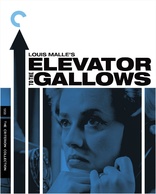
Movie rating
7.9 | / 10 |
Blu-ray rating
| Users | 0.0 | |
| Reviewer | 4.5 | |
| Overall | 4.5 |
Overview
Elevator to the Gallows (1958)
A self-assured businessman murders his employer, the husband of his mistress, unintentionally provoking an ill-fated chain of events.
Starring: Jeanne Moreau, Maurice Ronet, Georges Poujouly, Yori Bertin, Jean WallDirector: Louis Malle
| Foreign | Uncertain |
| Drama | Uncertain |
| Film-Noir | Uncertain |
| Crime | Uncertain |
| Thriller | Uncertain |
Specifications
Video
Video codec: MPEG-4 AVC
Video resolution: 1080p
Aspect ratio: 1.65:1
Original aspect ratio: 1.66:1
Audio
French: LPCM Mono (48kHz, 24-bit)
Subtitles
English
Discs
Blu-ray Disc
Single disc (1 BD)
Playback
Region A (locked)
Review
Rating summary
| Movie | 4.0 | |
| Video | 5.0 | |
| Audio | 5.0 | |
| Extras | 4.5 | |
| Overall | 4.5 |
Elevator to the Gallows Blu-ray Movie Review
Reviewed by Dr. Svet Atanasov December 27, 2017Louis Malle's "Elevator to the Gallows" a.k.a. "Ascenseur pour l'échafaud" (1958) arrives on Blu-ray courtesy of Criterion. The supplemental features on the disc include original trailers for the film; archival interviews with actors Jeanne Moreau and Maurice Ronet; archival footage from the soundtrack recording session; Louis Malle's student film "Crazelogie"; and a lot more. The release also arrives with an illustrated booklet featuring an essay by critic Terrence Rafferty, reprinted archival interview with Louis Malle, a tribute by film producer Vincent Malle, and technical credits. In French, with optional English subtitles for the main feature. Region-A "locked".
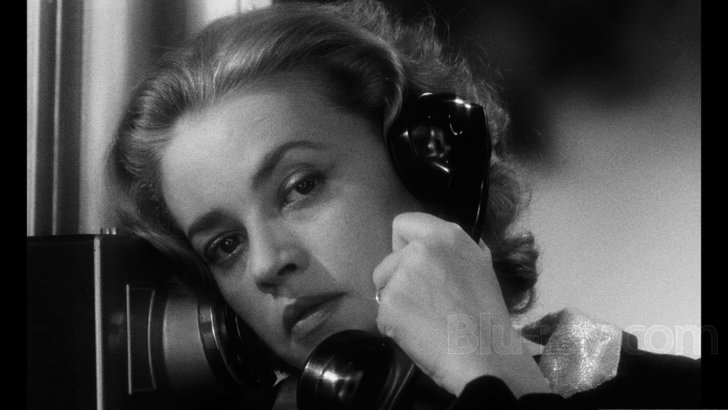
I love you
Louis Malle completed his first film, Elevator to the Gallows, in 1958, at the age of 24. To this day, it remains one of the most impressive directorial debuts in French cinema.
Julien Tavernier (Maurice Ronet, Purple Noon) is going to kill an innocent man (Jean Wall). He and his mistress, Florence Carala (Jeanne Moreau, Jules & Jim), who is married to the man, are certain that they have thought of everything and have the perfect plan. A few hours from now, when the man’s body is discovered, everyone will be convinced that he had committed suicide.
When Julien enters the man’s posh office and pulls a gun in front of his face, he smiles. The man thinks that it is a bad joke because for years Julien has been working for him and they have even become good friends. But Julien kills him, bolts the office door from the inside, and exits through the window. Moments later he gets in his fancy car, but then accidentally notices that a piece of rope is hanging from the window. He rushes back to remove the evidence, but gets stuck in the elevator when the guard shuts off the electricity and locks the building.
While Julien is trying to figure out how to get out of the elevator, his car is stolen by a feisty troublemaker (Georges Poujouly, Forbidden Games) and his naïve girlfriend (Yori Bertin). The young lovers head to the highway and after an exciting race decide to spend the night in a secluded hotel drinking champagne with a wealthy German couple. The boy uses Julien’s name to register in the hotel.
Meanwhile, sensing that something has gone terribly wrong, Julien’s mistress visits their favorite bars and restaurants and asks whether anyone has seen him. As she wanders around the city with her heart beating hard, a heavy rain begins to fall on the dark and empty streets.
The plot is structured as a big domino game. After Julien gets stuck in the elevator the perfect plan slowly begins to crumble and it increasingly becomes obvious that it is only a matter of time before various characters face the consequences of their actions.
Before the finale, there are several good twists, but the real surprises come from the manner in which Malle makes a point that people love to wear masks and without exception have multiple identities. This isn’t done as part of a big social commentary, but it certainly moves the film outside of the crime thriller category.
The camera movement is simple but the visuals are quite striking. Indeed, considering that Elevator to the Gallows was Malle’s first film, it is somewhat odd to see so many stylish close-ups and bold framing choices. (See the footage from the elevator and notice how effective the camera angles are). The manner in which light and shadow are captured also gives the film an unusually rich noir vibe, though this should not be surprising as it was lensed by the great cinematographer Henri Decae who had already worked with Jean-Pierre Melville on Bob Le Flambeur.
The improvised soundtrack by Miles Davis is legendary. It features indescribably lush trumpet solos that are an integral part of the film’s noirish atmosphere. This particular soundtrack is also credited for the emergence of acid jazz and various dub and trip-hop subgenres. (See DJ Krush & Toshinori Kondo, DJ Shadow, DJ Cam, etc).
Elevator to the Gallows Blu-ray Movie, Video Quality 
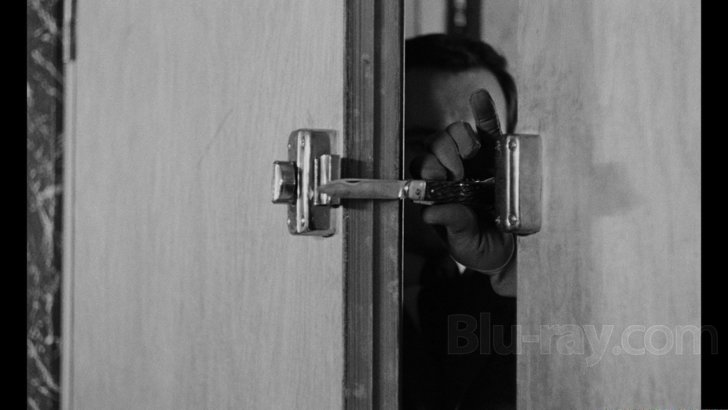
Presented in an aspect ratio of approximately 1.65:1, encoded with MPEG-4 AVC and granted a 1080p transfer, Louis Malle's Elevator to the Gallows arrives on Blu-ray courtesy of Criterion.
The following text appears inside the booklet provided with this Blu-ray release:
"This new 2K digital restoration was undertaken by Gaumont from the 35mm original camera negative at Eclair Laboratories in Vanves, France. Additional restoration was performed by the Criterion Collection. The original monaural soundtrack was mastered from the optical track of a 35mm fine-grain positive. Clicks, thumps, hiss, hum, and crackle were manually removed using Pro Tools HD and iZotope RX."
The release is sourced from the same restored master that French label Gaumont prepared a few years ago and used for the first Blu-ray release of Elevator to the Gallows. (British distributors Curzon/Artificial Eye also worked with the same master when they prepared their local release of the film).
This is how I have always seen this film, framed in 1.66:1, not in 1.37:1, which is how the French and British releases had it presented. So obviously this is a pretty dramatic difference that I find to be quite important. Furthermore, while initially I thought that the remaster was very good, I was not at all impressed with how Gaumont transferred it to Blu-ray a few years ago. Criterion's presentation is vastly superior -- it eliminates all of the horrible chroma noise and macroblocking patches and as a result density levels are now far better. Additionally, when we reviewed the British release I mentioned that the gamma levels appear slightly elevated but was unsure if this is how the French master was prepared or if it was an encoding issue. I am still not entirely sure, but I am happy to confirm that here the gamma levels are proper and the entire film has a clearly superior dynamic range. What this means is that if you view your discs on a very large screen or project, you will easily see much better balanced visuals that also strengthen overall fluidity. Grain is nicely exposed, but there are a few darker sequences where it does appear a tad loose for my taste (see screencapture #15). It is not a flaw, but there is no doubt in my mind that if the entire film was redone in 4K these sequences would have had 'tighter' and better defined grain. (For reference, if you upscale to 4K, the upscaler pretty much accomplishes precisely this effect). Image stability is excellent. There are no distracting large debris, cuts, damage marks, stains, or other age-related imperfections to report in our review. (Note: This is a Region-A "locked" Blu-ray release. Therefore, you must have a native Region-A or Region-Free player in order to access its content).
Elevator to the Gallows Blu-ray Movie, Audio Quality 
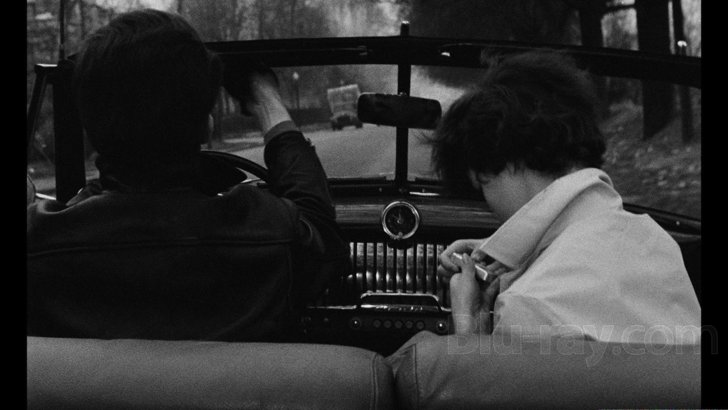
There is only one standard audio track on this Blu-ray release: French LPCM 1.0. Optional English subtitles are provided for the main feature.
There are no technical issues to report in our review. The lossless track handles Miles Davis' notorious score exceptionally well while the dialog is always crystal clear and easy to follow. Dynamic intensity is very good, but as it is very frequently the case with these types of period films it has native limitations.
Elevator to the Gallows Blu-ray Movie, Special Features and Extras 
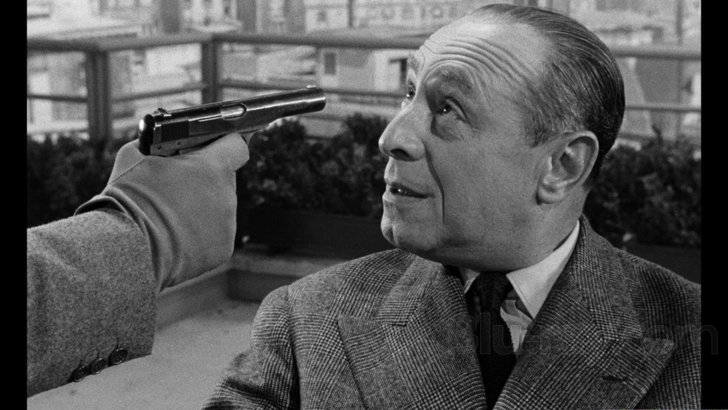
- Trailers - presented here are two trailers for Elevator to the Gallows.
1. Original theatrical trailer - in French, with optional English subtitles. (2 min, 1080p).
2. Rialto rerelease trailer - this trailer was created in 2005 for the U.S. theatrical rerelease of the film. In French, with optional English subtitles. (2 min, 1080i).
- Louis Malle - in this archival interview, Louis Malle discusses the early stages of his film career -- from his time at Ecole de cinema francaise and crucial relationship with Jacques-Yves Cousteau (Jacques Cousteau: The Silent World) and later on interactions with Robert Bresson until his bold decision to adapt Noël Calef's novel -- and the conception of Elevator to the Gallows as well as its visual style and tone. There are also some very good observations about the multiple identities that some of the main characters have. The interview was conducted in 1975, during the production of Black Moon, for Canadian television. In French, with optional English subtitles. (18 min, 1080i).
- Jeanne Moreau - in this archival interview, actress Jeanne Moreau recalls how she was approached and offered to play the character of Florence Carala in Louis Malle's directorial debut and explains how she felt during the filming of the film. There are also very good comments about the evolution of her character, the different layers (background stories) of the narrative, and the Miles Davis' extraordinary score. The interview was conducted exclusively for Criterion in 2005 at the Brasserie La Lorraine in Paris. In English, not subtitled. (18 min, 1080i).
- Malle and Moreau at Cannes - presented here is an archival filmed conversation between director Louis Malle and Jeanne Moreau in which the two discuss their long professional relationship with journalist Michel Field. A good portion of the exchanges address the production of Elevator to the Gallows. The conversation was conducted at the Cannes Film Festival in 1993. In French, with optional English subtitles. (11 min, 1080i).
- Maurice Ronet - in this archival interview, actor Maurice Ronet discusses his image as "the romantic lead". The interview was conducted by Francois Chalais in May 1957 for the French television program Reflets de Cannes, before the actor played Julien Tavernier in Elevator to the Gallows. In French, with optional English subtitles. (5 min, 1080i).
- The Miles Davis Score - on the night of December 4, 1957, at Le Poste Parisien studio in Paris, Miles Davis and his fellow musicians Kenny Clarke, Pierre Michelot, Rene Urtreger, and Barney Wilen joined director Louis Malle to record what would become the score for Elevator to the Gallows. Released in the the film's French title, Ascenseur pour l'échafaud, the soundtrack is recognized as a pivotal recording in the iconic musician's career. Presented here are interviews and documentary footage chronicling the recording season.
1. The Recording Session - rare studio footage filmed for the French television program Cinepanorama from the night when the score was recorded, plus a short interview with Louis Malle conducted by reporter Francois Chalais. In French, with optional English subtitles. (6 min, 1080i).
2. On Piano, Rene Urtreger - presented here is an archival interview with pianist Rene Urtreger, who worked on the score for Elevator to the Gallows. The bulk of the comments address the improvisational skills of Miles Davis and his 'feel' for the film as well as his professional relationship with various musicians that he toured and recorded with in Europe and the United States. The interview was conducted in 2005 and is presented courtesy of Arte France. In French, with optional English subtitles. (15 min, 1080i).
3. Miles Goes Modal: The Breakthrough Score for Elevator to the Gallows - in this archival program, jazz trumpeter and composer Jon Faddis and critic Gary Giddins discuss the legendary score of Elevator to the Gallows, the evolution of Miles Davis' career, and some of the ways in which he revolutionized jazz. The program was produced exclusively for Criterion in 2005. In English, not subtitled. (25 min, 1080i).
- Crazeologie (1954) - presented here is Louis Malle's early student film Crazeologie. The film was inspired by the theater of the absurd and the work of such playwrights as Samuel Beckett and Eugene Ionesco, and features Charlie Parker's song "Crazeology". In French, with optional English subtitles. (7 min, 1080i).
- Booklet - an illustrated booklet featuring an essay by critic Terrence Rafferty, reprinted archival interview with Louis Malle, a tribute by film producer Vincent Malle, and technical credits.
Elevator to the Gallows Blu-ray Movie, Overall Score and Recommendation 
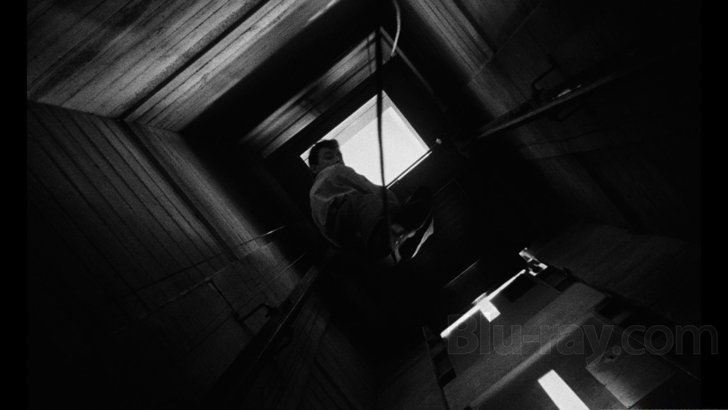
Criterion's upcoming Blu-ray release of Louis Malle's directorial debut, Elevator to the Gallows, is sourced from the same restored master that French label Gaumont prepared a few years ago. When I first saw the restoration I thought that it was very nice, but the Frencn and British releases both had the film framed in 1.37:1, not in 1.66:1, which is how I had seen it in the past. The French release also had some very serious encoding issues, and I had some reservations about the dynamic range of the visuals on the British release as well. I am happy to report that Criterion's release offers a widescreen presentation of the film and has the restoration looking vastly superior in high-definition. I am really pleased with the end result and now consider this release to be the all-around best presentation of Elevator to the Gallows on the home video market. VERY HIGHLY RECOMMENDED.
Similar titles
Similar titles you might also like

The Fire Within
Le feu follet
1963

Breathless
À bout de souffle
1960

Rififi
Du rififi chez les hommes
1955

Dheepan
2015

The Lovers
Les amants
1958

La Bête Humaine
1938

Le Samouraï 4K
1967

Le Cercle Rouge 4K
Uncut Version | includes remastered BD
1970

Diva
1981

Le Deuxième Souffle
1966

La Cérémonie
1995

Pickpocket
1959

Out 1
Out 1, noli me tangere
1971

The American Friend
Der amerikanische Freund
1977

Diary of a Chambermaid
Le journal d'une femme de chambre
1964

Babette's Feast
Babettes gæstebud
1987

The Bad Sleep Well
悪い奴ほどよく眠る / Warui yatsu hodo yoku nemuru
1960

La Haine
1995

The 400 Blows
Les quatre cents coups
1959

Witness in the City
Un Témoin Dans la Ville
1959